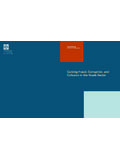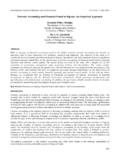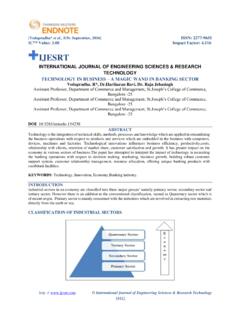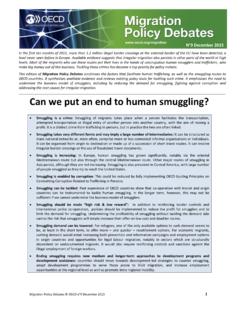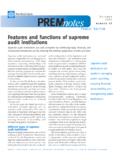Transcription of INTRODUCTION ANTI-CORRUPTION POLICY Ultimately, the ...
1 ANTI-CORRUPTION AND fraud POLICY INTRODUCTION "Ultimately, the struggle against corruption depends upon our sense of morality which tells us that our own egoistic interests do not come before those of public interest. We can take all kinds of preventative measures, and they can be broken down and subverted. But if the moral fibre of our public servants in the delivery of public services is high, then no amount of corruption can subvert our preventative measures" - Dr Dullar Omar (Fighting Corruption: Strategies for Prevention) If we are honest and open in our everyday dealings and communications with other people, if we fulfill our commitment at all times and practice trust, tolerance and respect, only then can we achieve dignity and integrity.
2 Everyday of our lives we are faced with choices and easy options that are filled with promises of wealth. Make sure your heart and your head agree on the honest choice, however difficult it may be. Remember it is the nature of our environments, which is tempting. We need to take responsibility for our choices. It is becoming increasingly difficult to stay honest and open, especially in light of the ever-changing environment around us. Your only obligation in life is to be true to yourself and your commitments. In the long run you will achieve more in life than those who sold out their principles for the short-term gain.
3 We expect people to trust us, and therefore it is up to us to give them the reasons to trust us. Our reputation of today will be based on our actions of the past. Our actions today are the building blocks of our future reputation. People at Justice hold dearly specific rich and positive values. Therefore, our employees' commitment to these values is the only single weapon against corruption and fraud . For example, integrity or the lack thereof, will decide whether we provide ourselves with II good or bad reputation. We provide you with the necessary scope to understand the relevant POLICY and code of ethics below.
4 This literature must be read in conjunction with the actual POLICY and code of ethics, which have been provided to you. If not, you must ask for these documents. ANTI-CORRUPTION POLICY SCOPE OF THE POLICY This POLICY applies to all corruption, fraud , theft and maladministration or suspected irregularities of this nature involving the following persons or entities: a. All officials/employees or entities involved in the administration of justice, including but not limited to: i) Employees/officials of the Department; ii) The Judiciary; iii) The Office of the National Director of Public Prosecutions; iv) Special Investigating Units established by law; and v) The Office of the Public Protector.
5 B. Consultants, suppliers, contractors and other providers of goods or services to the Department. THE POLICY It is the POLICY of the Department that corruption, fraud , theft, maladministration or any other dishonest activities of a similar nature will not be tolerated. In addition, such irregular activities will be investigated and followed up by the application of all remedies available within the full extent of the law, as well as the application of appropriate prevention and detection controls. These prevention controls include the existing financial and other controls and checking mechanisms as prescribed in the prescripts relevant to the activities of the Department.
6 It is the responsibility of all persons mentioned in paragraph (a) and (b) of these documents to report all incidents of corruption, fraud , theft and maladministration of his/her Head of Office. The term "Head of Office" means all managers. All Heads of Office are responsible for the detection, prevention and investigation of all corruption, fraud , theft and maladministration. The efficient application of Treasury Regulations issued in terms of the Public Finance Management Act, instructions contained in the codes of the Department, circulars and manuals of the Department as well as the Public Service in general, is one of the most important duties to be applied by every employee/official in the execution of their daily tasks and under no circumstances may there be a relaxation of the prescribed controls.
7 WHAT ARE THE ACTIONS CONSTITUTING CORRUPTION, fraud , THEFT AND MALADMINISTRATION Actions constituting corruption, fraud , theft and maladministration collectively refer to, but are not limited to: Any dishonest, fraudulent or corrupt act; Theft of funds, supplies, or other assets; Maladministration or financial misconduct in handling or reporting of money, financial transactions or other assets; Making a profit from insider knowledge; Disclosing confidential or proprietary information to outside parties; Irregularly accepting, requesting, offering or giving anything of material value to or from contractors, suppliers or other persons providing services/goods to the Department; Irregular destruction, removal or abuse of records, furniture and equipment; Any similar or related irregularity; and Deliberately omitting or refusing to report or act upon reports of any such irregular or dishonest conduct.
8 PROTECTION OF WHISTLE BLOWERS An employee/official, who suspects or reports suspected dishonest activity or any such activity that he/she has witnessed, may remain anonymous should he/she so require. Allegations made by employees/officials which are false and made with malicious intent, should be discouraged by Heads of Office. Where such malicious or false allegations are discovered, the person who made the allegations must be subjected to firm disciplinary action. There will be no reprisal by management against an employee/official who in good faith reported a violation or suspected violation.
9 CODE OF ETHICS AND BUSINESS CONDUCT Why should there be a code of ethics and business conduct? The purpose of such a code is the following: To serve as a brief description of the Department's core values; To provide a framework for identifying conduct that is ethical and acceptable for the employees and officials of the Department who, effectively, act as its agents at all levels; To create the context for the ethical use of authority; and To support all efforts aimed at curbing moral degeneration. SCOPE OF THIS CODE This Code of Ethics and Business Conduct applies to the following persons: a) All officials/employees or entities involved in the administration of justice, including but not limited to: i) Employees/officials of the Department; ii) Magistrates and employees of the Magistrates' Commission; iii) The Office of the National Director of Public Prosecutions; iv) Special Investigating Units established by law; and v) The Office of the Public Protector.
10 ETHICS Why should there be standards of ethics? To ensure that all stakeholders within the Department are aware of the basic values cherished by the Department, its employees (including management) and officials; and To ensure accountability within the Department in terms of fundamental ethical values and value systems. WHAT ARE THE FUNDAMENTAL ETHICAL STANDARDS CHERISHED AND EXPECTED BY THE DEPARTMENT? The Department cherishes the following values as ideals: Absolute integrity; A culture of honesty; Loyalty; Professionalism; Acceptance of responsibility and accountability; A positive public image Confidence from the public; Striving for and maintaining credibility; High standards of service delivery; A sense of pride in being employed by the Department; Sanctioning bad and rewarding good behaviour; and All other positive attributes contributing toward sound ethical standards.










